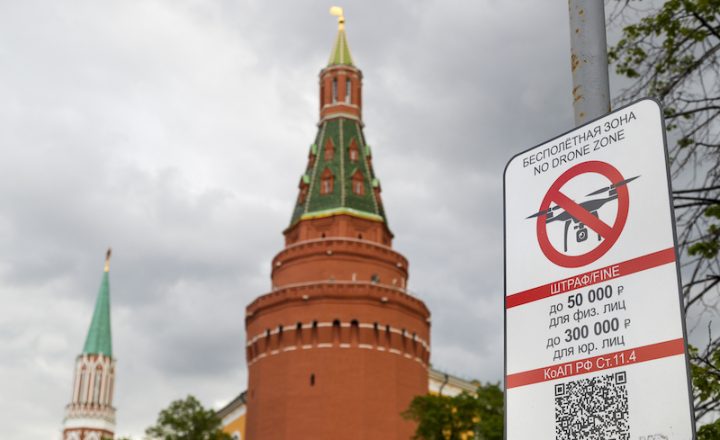Russian drones attacked Kyiv last night, the 17th such assault this month. But this time there was a difference: just after 4 a.m, Moscow came under what seemed to be a retaliatory attack. Most of the 25 drones were shot down by the city’s air defences, but three managed to get through. As Russia has found in Ukraine, this ratio is not unusual for drone attacks.
Of the drones that did succeed in flying over Moscow, one failed to detonate but the other two hit buildings in the New Moscow area of the city. Footage has surfaced on Russian social media purporting to show drones flying over Moscow suburbs in the direction of the capital, including over the upmarket area of Rublyovka, a suburb popular with many of Putin’s associates and home to a number of enormous mansions. In the videos, the drones seem to be flying low to the ground, just above the buildings.
Sergei Sobyanin, the mayor of Moscow, has been playing things down, insisting that damage to buildings has been minimal with just two people lightly injured and no fatalities so far. Several apartment blocks in the area have been evacuated, he said.
But what he didn’t have to say was that this attack was not remarkable for its damage. The remarkable thing was that it happened at all. It has been quite some time since Moscow (or any European capital) has had need of air defences. As I wrote some months ago, Muscovites may now consider themselves vulnerable: suddenly emerging as collateral in Putin’s war.
Photos circulating online, purportedly of the buildings damaged in the attack, show broken windows and some debris on the pavements outside. Much to the chagrin of Moscow’s motorists and taxi drivers, GPS signal in the city has once again been jammed – a textbook method of protection used by the Kremlin to make it harder to locate landmarks in the city.
Ukraine has, perhaps predictably, denied all responsibility for the drones. The Russian Ministry of Defence has issued a statement blaming Kyiv. Strikingly, though, while the Kremlin acknowledges the three drones that made it through their defences, the ministry has said that just eight drones were aimed at the capital. Evidence being compiled by the independent Russian media outlet Baza suggests the true figure is closer to 25, if not higher, which raises the question of whether the Kremlin is deliberately downplaying the scale of the threat.
Just three weeks ago we saw the Kremlin itself targeted by unarmed drones. With anticipation for Ukraine’s expected counter-offensive building by the day, this attack raises questions over what is truly going on: is this revenge by Kyiv for the intensified air attacks inflicted on the country by Moscow in recent weeks? Or is this part of some false flag attack by Russia, motivated by the Kremlin’s need to continue galvanising domestic support for a war they are floundering in?
A false flag attack by the Kremlin on its own capital city could be justified in being needed to raise some blitz spirit in Moscow: a sense of unity with regard to the war. But it would be a risky strategy that can backfire. While it plays into Putin’s continued narrative of Russian victimhood in this conflict, whether genuine or set-up, this second high profile drone attack on Moscow is at best embarrassing for the authorities as it implies the city’s defences are demonstrably porous and its people (especially in the wealthy areas) sitting ducks.
Today, Moscow authorities have been keen to maintain calm in the city. Governor of the Moscow region Andrei Vorobyev sought to reassure residents they were safe: ‘This morning, residents of some districts of the Moscow region could hear the sounds of explosions – this is our air defence working. Several drones were shot down on approach to Moscow. I ask residents to remain calm.’
Nevertheless, Muscovites have been unsettled by today’s attack. Vorobyev’s statement on his VK page has been flooded with concerned residents writing in to say they didn’t know what protocols to follow during an attack or where their nearest bomb shelters were. One local named Natalya wrote: ‘All the bomb shelters are in Moscow! They can also use the metro, but practically the whole Moscow region is like a sitting duck. All we have to rely on is our air defences. And ourselves…’
Meanwhile, the Kremlin has sought to maintain the facade that today is ‘business as usual’. In his daily media briefing, Putin’s press secretary Dmitry Peskov insisted the Russian president would be working from the Kremlin as usual. The attack on the capital today, he tried to say, was actually a result of Russia’s ‘very effective strike’ on Ukraine over the weekend. On the questions, put to him by reporters, of what citizens should do to protect themselves, Peskov declined to comment.
Last night is unlikely to be the last drone attack on Russian soil: my colleague Svitlana Morenets has written about the many other similar attacks. While questions remain about how the attack came about, one thing is certain: the war with Ukraine is decisively entering a new phase, one in which the conflict is now reaching the Russian home front.







Comments